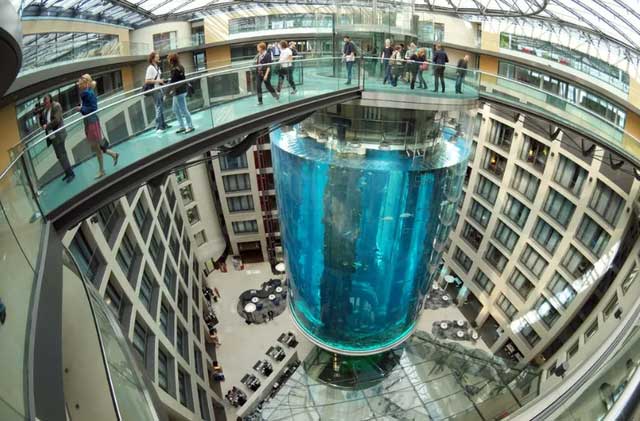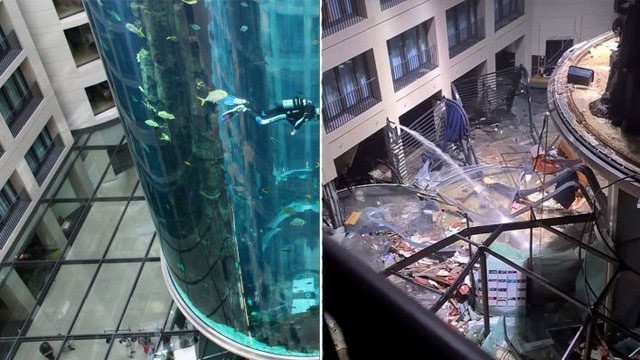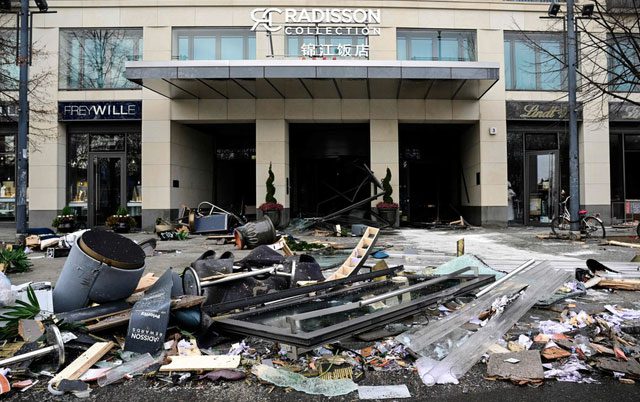In Berlin, a massive aquarium known as AquaDom has exploded, releasing thousands of fish and nearly a million liters of water onto the streets. So, what caused the aquarium to explode? And was there significant property damage?
What is the scale of AquaDom Aquarium?
The Radisson Blu Hotel in Berlin, Germany, houses the AquaDom aquarium. AquaDom was renowned as the largest cylindrical aquarium in the world, standing 15 meters tall, with a volume of approximately one million liters, surrounded by a glass elevator system for visitors.
AquaDom was built within the hotel in 2003 and provided guests the opportunity to view a variety of colorful fish up close. The aquarium housed over 1,500 creatures from 37 freshwater and saltwater species. In addition to the aquarium, the complex features shops, restaurants, a museum, and apartments.

AquaDom Aquarium – the largest cylindrical aquarium in the world (2015).
No Longer the Largest Cylindrical Aquarium in the World
On December 16, 2022, AquaDom suddenly exploded at 5:45 AM local time. Following the explosion, the entrance to the five-star hotel resembled the aftermath of a bomb blast. Debris was scattered everywhere, furnishings were torn apart, columns and windows were bent, and numerous objects lay strewn across the street.
A video recorded by Sandra Weeser, a member of the Federal Parliament staying at the hotel, showed the devastation caused by the explosion. In a local television interview, Ms. Weeser stated that she initially thought there had been a small earthquake until she saw waves of water rushing around her, realizing the aquarium had just exploded. An hour later, she was guided out of the building by firefighters.

The scene of devastation before and after the explosion.
What Caused the Aquarium to Explode?
The incident is currently under investigation. The Berlin Fire Service has not declared the cause of the explosion, and local news reports indicate that police found no evidence of an attack. Speculation has centered on weather conditions and technical faults, with some suggesting that the freezing outdoor temperatures may have caused the AquaDom’s glass to crack.
The owners of the AquaDom and hotel representatives are cooperating with police and firefighters to assess the situation and damages, aiming to determine the precise cause of the explosion.
How Severe is the Damage?
A few hours after the explosion, the entire street outside the building remained flooded. The weight of the water was estimated to be comparable to a tsunami, as it was powerful enough to uproot numerous trees and damage nearby shops.

The scene outside the hotel.
Nearly 1,500 tropical fish residing in the AquaDom aquarium perished. Fish carcasses littered the street outside the Radisson hotel in the freezing -7°C weather. Markus Kamrad, an official from the German Senate responsible for animal protection, stated: “This is a tragedy for the fish.”
In addition to being affected by the water pressure when the aquarium burst, some fish died due to the freezing temperatures outside or suffocated because they were not returned to water in time. Any creatures that survived the explosion faced significant challenges to be saved.
The Berlin Fire Department dispatched over 100 firefighters to the scene, as well as a rescue dog team to search for any casualties; fortunately, only two people suffered minor injuries and were taken to the hospital. If the incident had occurred just a few hours later when tourists were present, the loss of life could have been much greater.
Rescue Efforts by the Rescue Team
Firefighters cordoned off the intersection outside the Radisson hotel to assess the damage to the infrastructure. The hotel immediately closed and began evacuating guests. Some guests waited outside the building, hoping to retrieve their belongings. One unnamed woman expressed her shock and disbelief that no one had died.
By early afternoon, a special rescue unit arrived at the scene, equipped with hard hats, multi-tools, and ropes to access the building’s basement.
Local officials and firefighters recognized that hundreds of other creatures still remained in the basement of the building. Due to the power outage, fish in other tanks within the building were also at risk. Some coral species at the bottom of the tank survived thanks to a remaining puddle of water. “We need to pump out a large amount of water and inspect the entire building. Our top priority right now is to rescue the fish trapped in the basement,” said James Klein, a spokesperson for the Berlin Fire Department.
Mr. Kamrad indicated that the surviving fish would be transferred to the nearby Sea Life aquarium. Veterinary clinics were also preparing additional tanks in case the number of rescued fish increased. He remarked: “The good news is that we can save many rare species, including some types of snails, tilapia, and several varieties of angelfish.”


















































